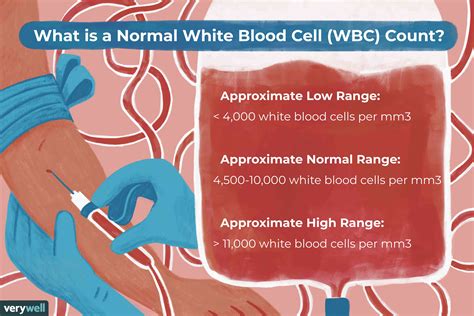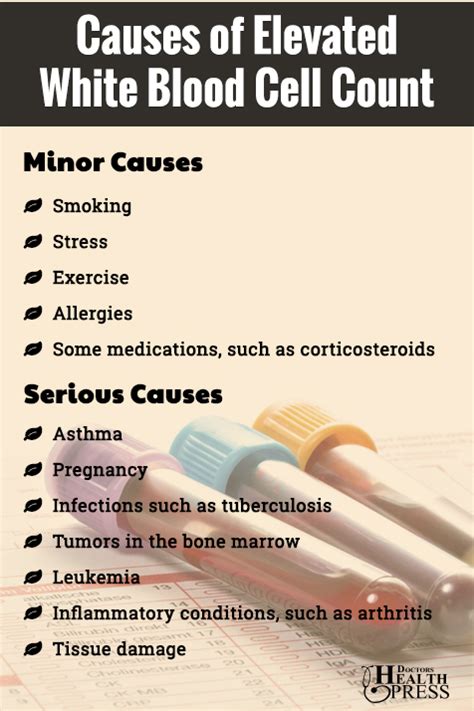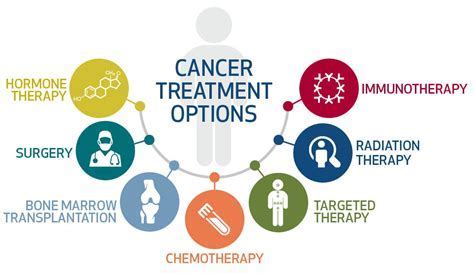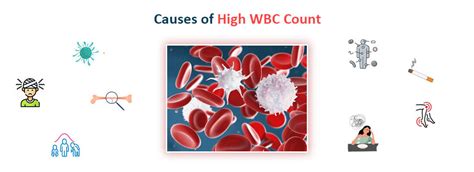Intro
Discover what a high WBC count means, indicating infection, inflammation, or immune response, and learn about white blood cell functions, symptoms, and diagnosis.
A high white blood cell (WBC) count, also known as leukocytosis, can be an indication of an underlying infection in the body. White blood cells are a crucial part of the immune system, and their primary function is to fight off infections and diseases. When the body detects an infection, it produces more white blood cells to combat the invading pathogens. As a result, a high WBC count can be a sign that the body is responding to an infection.
The normal range for WBC count is typically between 4,000 and 11,000 cells per microliter of blood. However, this range can vary slightly depending on the laboratory and the individual's age, sex, and other factors. A WBC count above 11,000 cells per microliter is generally considered high and may indicate an underlying infection or other condition. It's essential to note that a high WBC count can also be caused by other factors, such as inflammation, stress, or certain medications.
Infections that can cause a high WBC count include bacterial, viral, fungal, and parasitic infections. For example, pneumonia, urinary tract infections, and skin infections can all cause an increase in WBC count. Additionally, certain types of cancer, such as leukemia, can also lead to an elevated WBC count. It's crucial to consult a healthcare professional to determine the underlying cause of a high WBC count, as they can order additional tests and provide a proper diagnosis and treatment plan.
Understanding WBC Count

Types of Infections that Cause High WBC Count
There are several types of infections that can cause a high WBC count, including: * Bacterial infections, such as pneumonia, urinary tract infections, and skin infections * Viral infections, such as the flu, HIV, and herpes * Fungal infections, such as candidiasis and aspergillosis * Parasitic infections, such as malaria and toxoplasmosis It's essential to seek medical attention if you're experiencing symptoms of an infection, such as fever, chills, and fatigue, as a high WBC count can be a sign of a underlying infection that requires treatment.Symptoms of High WBC Count

Causes of High WBC Count
There are several causes of a high WBC count, including: * Infections, such as bacterial, viral, fungal, and parasitic infections * Inflammation, such as arthritis and inflammatory bowel disease * Stress, such as physical or emotional stress * Certain medications, such as corticosteroids and immunosuppressants * Cancer, such as leukemia and lymphoma It's crucial to consult a healthcare professional to determine the underlying cause of a high WBC count, as they can order additional tests and provide a proper diagnosis and treatment plan.Treatment Options for High WBC Count

Home Remedies for High WBC Count
There are several home remedies that can help to reduce a high WBC count, including: * Getting plenty of rest and avoiding stress * Staying hydrated by drinking plenty of fluids * Eating a healthy diet that's rich in fruits, vegetables, and whole grains * Avoiding sugary and processed foods * Practicing good hygiene, such as washing your hands regularly * Avoiding close contact with people who are sick It's essential to consult a healthcare professional before trying any home remedies, as they can provide personalized advice and treatment.Prevention of High WBC Count

Risks and Complications of High WBC Count
There are several risks and complications associated with a high WBC count, including: * Increased risk of infection * Increased risk of bleeding * Increased risk of blood clots * Increased risk of organ damage * Increased risk of cancer It's essential to consult a healthcare professional to determine the underlying cause of a high WBC count and receive proper treatment to prevent these risks and complications.Conclusion and Next Steps

We encourage you to share your thoughts and experiences with a high WBC count in the comments section below. Have you or someone you know been diagnosed with a high WBC count? What were the symptoms, and how was it treated? Your input can help others who may be going through a similar experience.
What is a high WBC count?
+A high WBC count, also known as leukocytosis, is an increase in the number of white blood cells in the blood. It can be a sign of an underlying infection or other condition.
What are the symptoms of a high WBC count?
+The symptoms of a high WBC count can vary depending on the underlying cause, but common symptoms include fever, chills, fatigue, headache, and muscle and joint pain.
How is a high WBC count treated?
+The treatment for a high WBC count depends on the underlying cause. If the high WBC count is caused by an infection, the treatment may involve antibiotics, antiviral medications, or antifungal medications. If the high WBC count is caused by inflammation, the treatment may involve anti-inflammatory medications.
